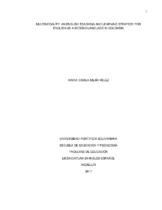Multimodality : an English teaching and learning strategy for English as a second languaje in Colombia
Fecha
2017Director/Asesor
Mora Vélez, Raúl Alberto
Tipo de contenido
bachelorThesis
Citación
Metadatos
Mostrar el registro completo del ítemDocumentos PDF
Resumen
This chapter is a literature review, which explores multimodality theory to propose it as an English teaching and learning strategy in Colombia. In terms of second language learning, multimodality can be an useful strategy for English teaching, since it provides multicultural classrooms’ realities which integrates ESL’ students’ perspectives, gives priority to their learning experiences and their identities (Ajayi, 2009). Therefore, it is possible to recognize that multimodality offers students a sensory perception process that can attend different learning styles, for it has a semiotic work that implies the joint of a variety of modes and communicative resources, which can maximize effect and benefit (Kress, 2010) to the student´s second language communication.
In this sense, to understand multimodality as a strategy, it is necessary for teachers to recognize the features that globalization arises, such as the huge development of technology (The New London Group, 1996), the appearance of variety of languages in cities or the increased of intercultural relations. This fact has impacted on teaching and learning practices. For instance, there are new learning environments, which have been created after the ICT and the different literacy practices. This has caused a redefinition of what it is meant by communication; therefore it implies that there are new resources to perform it. It involves then, that education explores other strategies for language and communication (Álvarez, J. 2016) which are aware of the new social communication practices. That is the reason why, multimodality is a concept that, working as a strategy, would help teachers and students to integrate new communicative practices and ICT to the learning process of English as a second language, to get more meaningful practices. It means, to provide students meaningful learning experiences in the classroom.
Palabra/s clave
Inglés -- Enseñanza
Aprendizaje de una segunda lengua
Multimodalidad (Educación)
Lenguaje y comunicación
Tecnologías de información y comunicación (Tics)
Tecnología educativa
Redes sociales en internet
Habilidades comunicativas
Métodos de enseñanza
Estrategias de aprendizaje
Proceso enseñanza-aprendizaje
Aprendizaje significativo
Procesos cognitivos
Formación profesional de docentes
Alfabetización multimodal
Educación -- Colombia
Investigación educativa
Colecciones
- Trabajos de grado [6688]
El ítem tiene asociados los siguientes ficheros de licencia:


